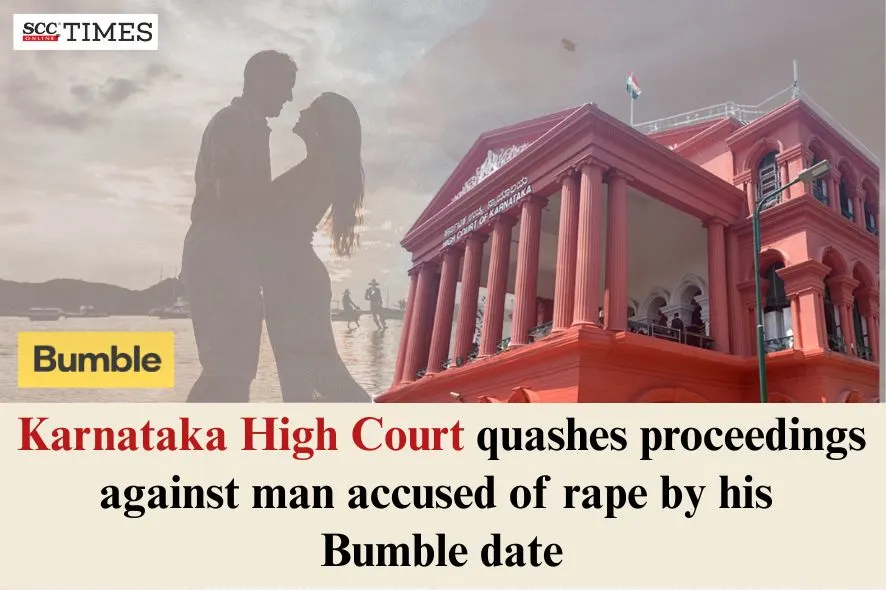Karnataka High Court: In a writ petition filed by a man accused of rape by his Bumble date, challenging the proceedings in a criminal case arising from the alleged incident of sexual assault, a Single-Judge Bench of M. Nagaprasanna, J., allowed the petition, quashing the First Information Report (‘FIR’) and the consequential proceedings. The Court held that permitting the prosecution to continue would be a ritualistic procession towards miscarriage of justice and an abuse of the process of the law. The Court observed the nuanced distinction between consensual intimacy and the grave allegation of rape, noting that the relationship in question was born of mutual volition.
Background
The accused and the complainant initially became acquainted through the dating application ‘Bumble’ and subsequently nurtured their acquaintance for over a year by exchanging images and conversations on Instagram. On the morning of 11-08-2024, they resolved to meet in person. After a meal at a restaurant, they proceeded to an OYO Flagship hotel where physical intimacy is alleged to have ensued. The following day, the accused dropped the complainant back in her apartment. On 13-08-2024, the complainant, moved by certain physical discomfort, got herself examined at the hospital and came to know that she was a victim of sexual assault. She went to the Police Station and lodged a complaint on the same day, and a crime was registered for the alleged offence punishable under Section 64 of the Bharatiya Nyaya Sanhita, 2023 (‘BNS’). The accused was arrested, and the police, after investigation, filed a final report against him. Aggrieved, the accused filed the present petition.
Analysis and Decision
The Court perused the complaint and noted that it was alleged in the complaint that the accused began to seduce the complainant for sexual intercourse to which she did not consent. In spite of it, the accused indulged in sexual intercourse. The Court further noted that the chats between the accused and the complainant indicate that the acts between the accused and the complainant were all consensual.
In Dhruvaram Murlidhar Sonar v. State of Maharashtra, (2019) 18 SCC 191, the Supreme Court had emphasized that the courts must carefully examine whether the accused had a mala fide motive and made a false promise to marry only to satisfy lust (which falls under the ambit of cheating/deception), or if the accused was unable to marry due to unforeseen circumstances or if the prosecutrix agreed to the sexual intercourse out of love and passion, and not solely due to a misconception.
In Deepak Gulati v. State of Haryana, (2013) 7 SCC 675, the case drew a distinction between rape and consensual sex. It was held that the physical relationship had clearly developed with the consent of the prosecutrix as there was no resistance or complaint, despite the prosecutrix living and traveling with the accused for several days.
The Court after taking into consideration various judgments noted that,
“The Apex Court, in the afore-quoted judgments, has etched with clarity, the nuanced distinction between consensual intimacy and the grave allegation of rape. A relationship born of mutual volition, even if it founders in disappointment, cannot, save in clearest of cases, be transmuted into an offence under the criminal law. If the present prosecution were permitted to meander into a trial, it would be nothing but a ritualistic procession towards miscarriage of justice and indeed become an abuse of the process of the law.”
In light of the afore-stated discussion, the Court allowed the writ petition and quashed the FIR and consequential proceeding against the man accused of rape by his Bumble date.
[Sampras Anthony v. State of Karnataka and another, 2025 SCC OnLine Kar 20452, decided on 25-10-2025]
Advocates who appeared in this case:
For the Petitioner: Athreya C. Shekar, Advocate
For Respondent: B.N. Jagadesha, Addl. SPP



